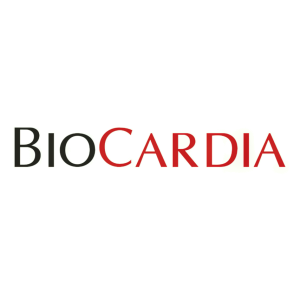BioCardia Announces Positive DSMB Review and Recommendation to Continue Phase III Pivotal CardiAMP Cell Therapy Heart Failure Trial
Rhea-AI Summary
BioCardia (Nasdaq: BCDA) announced favorable results from its Phase III CardiAMP® Cell Therapy Heart Failure Trial. The independent Data Safety Monitoring Board (DSMB) reported no significant safety concerns and recommended continuing the study. The trial includes data from 101 patients past the 12-month primary endpoint, showing a higher one-year survival rate compared to similar trials. An adaptive statistical analysis plan is suggested for future evaluations. The study aims to enroll 260 patients across 40 U.S. and Canada centers, with results pending formal unblinding and analysis.
Positive
- No significant safety concerns reported by the DSMB.
- Patient follow-up data available for over 93% of participants.
- One-year survival rate exceeds that of similar pivotal trials.
- Favorable trends noted in health outcomes across treated and control patients.
- Potential for adaptive statistical analysis plan could enable early efficacy readout.
Negative
- None.
News Market Reaction – BCDA
On the day this news was published, BCDA declined 2.93%, reflecting a moderate negative market reaction.
Data tracked by StockTitan Argus on the day of publication.
Adaptive Statistical Analysis Plan Recommended
SUNNYVALE, Calif., Aug. 31, 2022 (GLOBE NEWSWIRE) -- BioCardia®, Inc. [Nasdaq: BCDA], a developer of cellular and cell-derived therapeutics for the treatment of cardiovascular and pulmonary disease, today announces that the independent Data Safety Monitoring Board (DSMB) has completed its prespecified data review for the ongoing Phase III pivotal CardiAMP® Cell Therapy Heart Failure Trial (clinicaltrials.gov Identifier: NCT02438306), for which FDA granted Breakthrough Designation earlier this year. The DSMB based their review on available data for all participating patients enrolled, including 101 patients at or past the 12-month primary endpoint. The DSMB performed a risk-benefit assessment, indicated no significant safety concerns, and recommended that the study continue as designed. The DSMB also recommended that BioCardia consider implementing an adaptive statistical analysis plan which could enable an early readout for study treatment efficacy.
Patient visit data was available for
“It is outstanding news that available blinded results show the trial integrity remains intact with few patients lost to follow-up visits. The phenomenal follow-up during these difficult times is to the credit of our dedicated clinical partners and the patients participating in the study,” said BioCardia CEO Peter Altman, Ph.D. “The patients also appear to be doing relatively well. It has long been noted that patients participating in clinical trials do better. The meaningful improvements on average across both treated and control patients being observed here are great for those participating in the study. We would not expect the control patients in this study to improve where control placebo patients in our Phase II trial did not.3,4 The Data Safety Monitoring Board’s support for implementing an adaptive design based on the data in hand is encouraging and we will drive toward implementing an adaptive statistical analysis plan in the coming months with the involvement of the study’s executive steering committee and the FDA. An adaptive statistical analysis plan will enable the study to be powered based on the ongoing trial data and may allow earlier study readout.”
The ongoing multi-center, double-blind, randomized (3:2), controlled pivotal CardiAMP Cell Therapy Trial for Heart Failure is expected to enroll 260 patients at up to 40 centers in the U.S. and Canada. The trial’s primary endpoint is an outcomes composite score based on a three-tiered Finkelstein-Schoenfeld (FS) hierarchical analysis, an established outcomes design that has been used in other leading heart failure programs. The FS procedure is a ranked analysis that compares occurrence of cardiovascular and other health-related events, along with functional capacity measures, through one year in patients receiving the study treatment to patients in the control arm who don’t receive the study treatment. Data submitted to the DSMB for review provided the group with visibility into the risks and benefits of the trial at its primary endpoint.
The DSMB consists of two world-renowned cardiologists with experience in heart failure and interventional cardiology, as well as a world-renowned biostatistician with considerable experience evaluating trial data for chronic diseases, including heart failure. Their primary responsibility is to ensure patient safety and to halt or pause the clinical investigation if the risk of the therapy appears to outweigh its potential benefit. Such risk-benefit analysis typically includes an analysis of futility to reach the primary endpoint of the clinical trial as designed.
Patients interested in learning about the study can visit www.cardiamp.com or www.clinicaltrials.gov for more information.
About the CardiAMP Cell Therapy Program
CardiAMP Cell Therapy uses a patient’s own (autologous) bone marrow cells delivered to the heart in a minimally invasive, catheter-based procedure to potentially stimulate the body’s natural healing response. The CardiAMP Cell Therapy Heart Failure Trial is the first multicenter clinical trial of a stem cell therapy to prospectively screen for stem cell therapeutic potency in order to improve patient outcomes. CardiAMP Cell Therapy incorporates three proprietary elements not previously utilized in an investigational cardiac cell therapy trial, which the company believes improves the probability of success of the Phase III Trial: a pre-procedural diagnostic for patient selection, a high target dosage of cells, and a proprietary delivery system that has been shown to be safer than other intramyocardial delivery systems and exponentially more successful in cell retention. CAUTION - Limited by United States law to investigational use.
About BioCardia®
BioCardia, Inc., headquartered in Sunnyvale, California, is developing cellular and cell-derived therapeutics for the treatment of cardiovascular and pulmonary disease. CardiAMP™ autologous and NK1R+ allogeneic cell therapies are the Company’s biotherapeutic platforms that enable four product candidates in development. The CardiAMP Cell Therapy Heart Failure Trial investigational product has been granted Breakthrough designation by the FDA, has CMS reimbursement, and is supported financially by the Maryland Stem Cell Research Fund. The CardiAMP Chronic Myocardial Ischemia Trial also has CMS Reimbursement. BioCardia also partners with other biotherapeutic companies to provide its delivery systems and development support to their programs studying therapies for the treatment of heart failure, chronic myocardial ischemia and acute myocardial infarction. For more information visit: www.BioCardia.com.
- Packer M., et al., for the EMPEROR-Reduced Trial Investigators, Cardiovascular and Renal Outcomes with Empagliflozin in Heart Failure, N Engl J Med 2020; 383:1413-1424
- McMurray JJV, et al for the PARADIGM-HF Investigators and Committees, Angiotensin–Neprilysin Inhibition versus Enalapril in Heart Failure, N Engl J Med 2014; 371:993-1004.
- Heldman AW, et al Transendocardial Mesenchymal Stem Cells and Mononuclear Bone Marrow Cells for Ischemic Cardiomyopathy The TAC-HFT Randomized Trial, JAMA.2013.282909.
- Wong Po Foo et al., The Transendocardial Autologous Cells in Ischemic Heart Failure Trial Bone Marrow Mononuclear cells (TAC-HFT-BMC) Randomized Placebo Controlled Blinded Study, Regenerative Medicine 2015, 10(7s), S169.
Forward Looking Statements:
This press release contains forward-looking statements that are subject to many risks and uncertainties. Forward-looking statements include, among other things, statements relating to study enrollment expectations, implementation of changes in the statistical analysis plan, the likelihood of safety and patient benefit and the ultimate success of our clinical cell therapy programs. These forward-looking statements are made as of the date of this press release.
We may use terms such as “believes,” “estimates,” “anticipates,” “expects,” “plans,” “intends,” “may,” “could,” “might,” “will,” “should,” “approximately” or other words that convey the uncertainty of future events or outcomes to identify these forward-looking statements. Although we believe that we have a reasonable basis for each forward-looking statement contained herein, we caution you that forward-looking statements are not guarantees of future performance and that our actual results may differ materially from the forward-looking statements contained in this press release. As a result of these factors, we cannot assure you that the forward-looking statements in this press release will prove to be accurate. Additional factors that could materially affect actual results can be found in BioCardia’s Form 10-K filed with the Securities and Exchange Commission on March 29, 2022, under the caption titled “Risk Factors.” BioCardia expressly disclaims any intent or obligation to update these forward-looking statements, except as required by law.
Media Contact:
Anne Laluc, Marketing
Email: alaluc@BioCardia.com
Phone: 650-226-0120
Investor Contact:
David McClung, Chief Financial Officer
Email: investors@BioCardia.com
Phone: 650-226-0120








